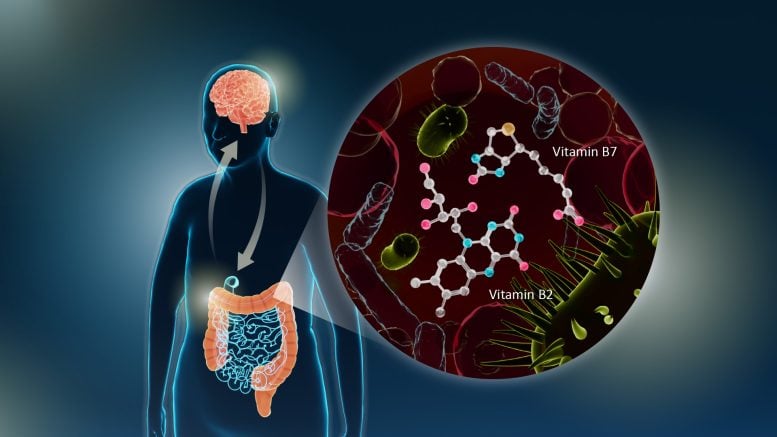
Nagoya University researchers found that deficiencies in gut bacteria genes for vitamins B2 and B7 are linked to Parkinson’s disease, suggesting that B vitamin supplementation could be a potential treatment.
A study conducted by the Nagoya University Graduate School of Medicine in Japan has discovered a connection between gut microbiota and Parkinson’s disease (PD). The researchers observed a decrease in gut bacteria genes responsible for synthesizing the essential B vitamins B2 and B7. Additionally, they found a link between the deficiency of these genes and reduced levels of agents that help preserve the integrity of the intestinal barrier.
This barrier prevents toxins from entering the bloodstream, which causes the inflammation seen in PD. Their findings, published in npj Parkinson’s Disease, suggest that treatment with B vitamins to address these deficiencies can be used to treat PD.
PD is characterized by a variety of physical symptoms that hinder daily activities and mobility, such as shaking, slow movement, stiffness, and balance problems. While the frequency of PD may vary between different populations, it is estimated to affect approximately 1-2% of individuals aged 55 years or older.
Various physiological processes are heavily influenced by the microorganisms found in the gut, which are collectively known as gut microbiota. In ideal conditions, gut microbiota produce SCFAs and polyamines, which maintain the intestinal barrier that prevents toxins from entering the bloodstream. Toxins in the blood can be carried to the brain where they cause inflammation and affect neurotransmission processes that are critical for maintaining mental health.
The Research Process
To better understand the relationship between the microbial characteristics of the gut in PD, Hiroshi Nishiwaki and Jun Ueyama from the Nagoya University Graduate School of Medicine conducted a metanalysis of stool samples from patients with PD from Japan, the United States, Germany, China, and Taiwan. They used shotgun sequencing, a technique that sequences all genetic material in a sample. This is an invaluable tool because it offers researchers a better understanding of the microbial community and genetic makeup of the sample.
They observed a decrease in the bacterial genes responsible for the synthesizing of riboflavin (vitamin B2) and biotin (vitamin B7) in patients diagnosed with PD. Riboflavin and biotin, derived from both food and gut microbiota, have anti-inflammatory properties, which may counteract the neuroinflammation seen in diseases like PD.
The Role of B Vitamins
B vitamins play crucial roles in the metabolic processes that influence the production and functions of short-chain fatty acids (SCFAs) and polyamines, two agents that help maintain the integrity of the intestinal barrier, preventing toxins from entering the bloodstream. An examination of fecal metabolites revealed decreases in both in patients with PD.
The findings indicate a potential explanation for the progression of PD. “Deficiencies in polyamines and SCFAs could lead to thinning of the intestinal mucus layer, increasing intestinal permeability, both of which have been observed in PD,” Nishiwaki explained. “This higher permeability exposes nerves to toxins, contributing to abnormal aggregation of alpha-synuclein, activating the immune cells in the brain, and leading to long-term inflammation.”
He added, “Supplementation therapy targeting riboflavin and biotin holds promise as a potential therapeutic avenue for alleviating PD symptoms and slowing disease progression.”
The results of the study highlight the importance of understanding the complex relationship among gut microbiota, metabolic pathways, and neurodegeneration. In the coming years, therapy could potentially be customized based on the unique microbiome profile of each patient. By altering bacterial levels in the microbiome, doctors can potentially delay the onset of symptoms associated with diseases like PD.
“We could perform gut microbiota analysis on patients or conduct fecal metabolite analysis,” Nishiwaki said. “Using these findings, we could identify individuals with specific deficiencies and administer oral riboflavin and biotin supplements to those with decreased levels, potentially creating an effective treatment.”
Reference: “Meta-analysis of shotgun sequencing of gut microbiota in Parkinson’s disease” by Hiroshi Nishiwaki, Jun Ueyama, Mikako Ito, Tomonari Hamaguchi, Keiichi Takimoto, Tetsuya Maeda, Kenichi Kashihara, Yoshio Tsuboi, Hiroshi Mori, Ken Kurokawa, Masahisa Katsuno, Masaaki Hirayama and Kinji Ohno, 21 May 2024, npj Parkinson’s Disease.
DOI: 10.1038/s41531-024-00724-z